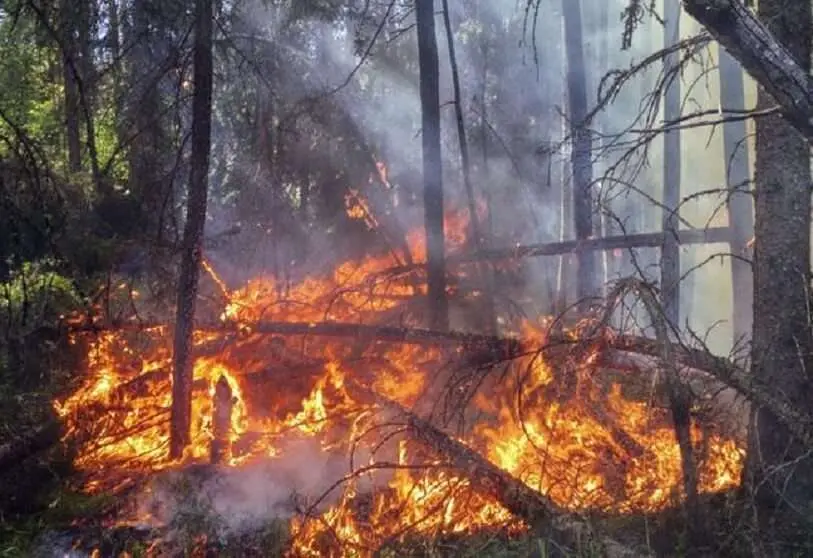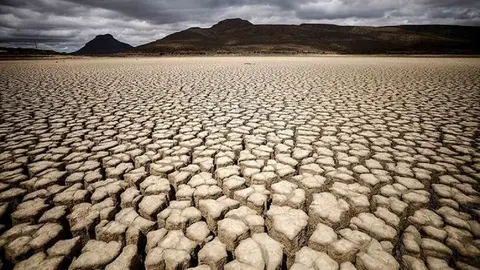The planet suffers from suffocating high temperatures

It's the Gran Vía in Madrid and it looks like a ghost town: the 40 degrees centigrade fall like heavy lead on the asphalt, raising the sensation of such a dry heat that people prefer to be indoors, under the coolness of the air conditioning. Most of the ice-cream parlours are closed, waiting for the sun to begin to set before raising their shutters; it is at dusk that the city comes back to life and the hustle and bustle of people fills every place. It's already early morning and whole families line up to buy ice cream.
For the past five years, the European continent has been suffering the ravages of increasingly unusual summers with record-breaking temperatures.
This year, according to the United Nations (UN), July was the hottest in human history, ushering in "the era of global boiling".
The consequences are tragic, warns the head of the United Nations, António Guterres, not only because of the monsoons that affect thousands of children in the most vulnerable areas, but also because of all the families who must escape the flames and the workers who collapse in the face of such temperatures.
Europe's climate has been radically and sharply transformed, with half of the continent's countries spending a good part of July at 40 degrees Celsius and the other half, the northernmost part, above 25 degrees Celsius.
The Mediterranean basin has long been a summer nightmare: from Greece and Italy to Algeria and Tunisia, but neither France nor Spain, much less Portugal, have been spared by droughts, desertification and fires because the heat bomb causes a vicious circle of destruction.
In the last month, Greece has suffered more than 600 fires that have been difficult to extinguish because of temperatures above 45 degrees Celsius.
The fire emergency has prompted the evacuation of thousands of tourists from many Greek islands severely affected by the situation itself.
The Greek authorities report that a total of 130,000 hectares have burned in July; 58,000 hectares have burned on the island of Rhodes alone, but Corfu, Evia and the Peloponnese and even Athens have been engulfed in flames.
In Italy, a few days ago, Sicily recorded temperatures in excess of 47 degrees Celsius; Italy's prime minister, Giorgia Meloni, bravely appealed for emergency help from international fire brigades.
Fires have also had to be put out in Palermo with outbreaks in the wooded area of Altofonte; in Calabria, as well as in Puglia; and neither Sardinia nor Lombardy have escaped.
Spain is on the same path: the fire has burned 47,785 hectares, the Ministry for Ecological Transition and Demographic Challenge has acknowledged that the fire this summer has burned three times as much area as last year.
In the Iberian country, the problem is not only Madrid with temperatures of 40 degrees, in the south, in Andalusia, there are cities where you cannot go out in the street because people are literally baking in the sun: from Cordoba to Seville and the coast of Malaga are affected by the African wind, the terral or terrá, as the locals call it. Some streets are deserted because nobody dares to go out during the day and people have to wait for the sun to go down after nine o'clock at night because the 45 degrees with the hot wind to breathe is unbearable.
Last year, according to Nature Medicine, more than 61,000 people in Europe died from heat stroke and this summer season could end with nearly 100,000 deaths. Heat kills and it is not a hoax. The UN itself claims that human-induced global warming "causes more than a third of heat-related deaths" worldwide.
A few days ago in Iran, the government decided to give the population two days off because the extreme heat broke the 50 degrees Celsius barrier in all the southern provinces of the Persian country.
Government spokesman Ali Bahadori Jahromi said the decision to close government offices, banks and schools on Wednesday and Thursday came after the Health Ministry warned of a possible increase in cases of heat exhaustion due to the high temperatures and imminent damage to human health.
Its capital Tehran was forecast to approach 55 degrees Celsius. The World Health Organisation (WHO) warns of imminent death from heat stroke.
It is getting hotter in many parts of the world. Many experts anticipate that climate change will eventually transform the habits of people who will have to deal with longer, hotter days and Mediterranean nights above 30 degrees Celsius.
And as more and more people are dying from heat stroke, this paradigm in human health is also altering: if cold deaths used to predominate over heat deaths in humans, this trend is altering year by year.
A study published in the journal The Lancet Planetary Health took into account the different optimal temperatures for people living in different regions and concluded that more than 5 million people die each year worldwide due to excessively hot or cold conditions. Primarily in the peaks of heat-related mortality, an accelerated increase is observed.
"The study involving dozens of scientists from around the world found that 9.4 per cent of global deaths each year are attributable to exposure to heat or cold, equivalent to 74 additional deaths per 100,000 people," according to the analysis.
Researchers analysed mortality and climate data from 750 locations in 43 countries between 2000 and 2019 and found that the average daily temperature in these locations increased by 0.26 degrees Celsius per decade.
The study found that more people died from cold than from heat during that period. But heat-related deaths were increasing, while cold-related deaths were decreasing.
Researcher Yuming Guo, from Monash University in Australia, and one of the coordinators of the study, warned that in the face of climate change, heat-related deaths will continue to increase and eventually impact mortality rates as one of the leading causes of human death.
"In the future, cold-related mortality should continue to decrease, but because heat-related mortality will continue to increase, that means there will be a tipping point," according to Guo.
The highest excess heat-related mortality rate was recorded in Eastern Europe, while sub-Saharan Africa had the highest low-temperature-related mortality rate.
In itself, humans experience a dangerous cocktail in their health, because it increases the risks of heart attack, impacts on the rise in body pressure and increases the frequency of strokes.
A natural heat pump
The UN Secretary-General has long been making almost apocalyptic speeches about climate change, trying to bring world leaders, politicians, businessmen and influencers to their senses.
Guterres has called climate change "terrifying" while warning that the current ravages "are just the beginning" of what is to come on top of it because "it is already out of control".
The UN says the era of global warming has ended, giving way to "the era of global boiling" that will have extreme peaks creating phenomena that will affect all living organisms.
"Leaders must step up climate action, particularly the major industrial nations of the G20 that are responsible for 80% of global emissions; upcoming summits, including the UN Climate Ambition Summit in September and the COP28 Climate Conference in Dubai next November, will be a critical opportunity to unite global efforts," Guterres said.
With extreme weather becoming the new normal, Guterres called for a global increase in adaptation investment to save millions of living beings from the impacts of climate change, particularly in developing countries. Humans suffer, but so do animals and plants.
"Developed countries must present a clear and credible roadmap for doubling adaptation finance by 2025. In addition, all governments must implement an action plan under the auspices of the UN to ensure that everyone on the planet is protected by early warning systems by 2027.
Warming seas and drying rivers
Equally worrying is the fact that ocean temperatures are at their highest levels on record, as measured since April and worsening during the summer.
Chris Hewitt, director of Climate Services at the World Meteorological Organization, noted that, from 2015 to 2022, they experienced the eight warmest years on the basis of a 173-year dataset.
This was despite the fact that the cooling La Niña phenomenon prevailed towards the end of that period in the Pacific region, which slightly slowed global average temperatures.
"But now La Niña is over and has been replaced by the sea-warming El Niño effect, waters have begun to warm in the tropical Pacific, bringing the almost certain likelihood that one of the next five years will be the warmest on record ever," Hewitt said.
It is also more likely that global average temperatures will temporarily exceed the 1.5 degrees Celsius threshold above pre-industrial levels for at least one of the next five years.
And while the waters of the Mediterranean averaged 25 degrees Celsius last July, the flows of Europe's once most stately and affluent rivers are drying up.
From the Loire to the Danube, dry rivers threaten Europe's trade, transport, energy and wildlife; Europe's major rivers are shrinking under the most severe climate-induced drought in decades.
Germany's situation is highly critical: the Rhine is rapidly drying up, which could make it unviable for inland waterway shipping in less than two years; its waters are used by ships carrying oil, coal and gas supplies.
In addition, this summer, the so-called "hunger stones" have once again been visible in the Czech Republic's Decin, at the mouth of the river Elbe.
In France, much of the water from the Rhône and Garonne rivers could not be used to cool its power plants because the water temperature was above 27 degrees Celsius.
Meanwhile, in Italy, the Po, the longest river, is struggling to maintain its width during the region's worst drought in seventy years; water has already completely disappeared from some tributaries, for example in Turin.
As temperatures continue to rise, the consequences will be very negative, not only drought, desertification, fires, increased mortality of living things, but also an incalculable economic impact. The planet is suffocating...





